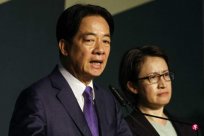The pessimism of the Chinese stock market continued to ferment, and the A -share syndrome comprehensive index fell to the low point in the past four years on Thursday (January 18), and eventually kept the 2800 -point mark in stunning.The analysis believes that the decision -making level may send the "national team" to rescue the market, but in the short term, it will not introduce the strong stimulus policy of market expectations, and investors will be patiently tested.
TheThe Shanghai Stock Exchange Index has lost 3000 points and 2900 points in the past 40 days.China ’s economic data was released the next day in 2023. The Shanghai Stock Exchange Index fell below 2800 points an hour and a half after the opening on Thursday, which fell to 2760.98 points, a new low since April 2020.
About 4,800 stocks in Shanghai and Shenzhen fell in the morning.The Shanghai and Shenzhen 300 index reflecting the trend of blue -chip stocks in Shanghai and Shenzhen cities fell at around 11.15 am to the lowest 3171.63 points in five years.
The decline in A shares continued until the opening of the market, but an hour before the closed market, the quickly rebound began at around 2 pm.After 10 minutes, the Shanghai Stock Exchange Index re -stood 2,800 points, and closed the market at 2845.78 points, which rose 0.43 % throughout the day.300 CSI closed up 1.41 % to 3274.73 points.
Behind the rapid rebound of A shares, there are multiple trading funds (ETFs) that track the trend of the broader market.The average daily turnover of Huatai Berry CSI 300ETF soared on Thursday to 15 billion yuan (RMB, Same as Sim, S $ 2.86 billion), which was far higher than the average daily turnover of the past month.The single -day turnover of the Shanghai and Shenzhen 300ETF also reached a record high of 5.6 billion yuan.
This reminds investors that the China State -owned Fund Central Huijin Investment Corporation made an increase in ETFs in October last year, driving the operation of the stock market rebound.The Securities Times' "Brokerage China" platform quoted the industry insiders that the action on Thursday afternoon was similar to the previous, and it is not ruled out that the possibility of "national team" funds entering the market.
Fu Fangjian, an associate professor of Li Guangqian Business School of Singapore Management University, analyzed in an interview with Lianhe Zaobao. The transaction volume of related ETFs soared in a short time, and it was difficult to drive by individual investment institutions.Points are more in line with the characteristics of the "national team" rescue.It is expected that this will stabilize market emotions in the short term and temporarily stop falling for A shares.
On the other hand, the Hong Kong stock market ushered in a rebound after three days in a row.The Hang Seng Index opened high on Thursday. Under the increase in semiconductors and Internet stocks, it climbed 0.75 % to 15391.79 points throughout the day.
China lacks highlights of the annual economic data that was released one day before. Analysts believe that if the official has not introduced a large -scale stimulus policy, it is difficult to maintain the economic growth rate this year at 5 %.The Chinese population data released during the same period shows that the aging trend has intensified, and further impacts the fragile market emotions.
Fu Fangjian said that although investors generally look forward to the official increased stimulus, the preferential consideration of the decision -making layer is not to rescue the market, but to adjust the economy while taking advantage of the low tide period, such as reducing dependence on the real estate industry."From the current point of view, the high -level is strong in this regard, and the side effect is to affect the stock market emotion. Therefore, it is not expected that there will be a big bull market this year, and the stock market will continue to rise until the economic fundamentals have real good news."
Chinese Prime Minister Li Qiang emphasized at the Davos Forum in Switzerland on Tuesday (16th) that China "insists not to engage in strong stimuli, but does not exchange long -term risks for short -term growth at the cost of accumulating long -term risks."Dynamics of development".
The People's Bank of China has maintained key policy interest rates on Monday (15th), which disappoints investors who look forward to interest rate cuts.UBS Investment Bank Asian Economic Research Director and Chief Chinese Economist Wang Tao Wang Tao studied and judged at the investor conference on Thursday that the possibility of significant interest rate cuts or quantitative looseness is unlikely. Officials may more prompt the economy through fiscal policy.



